OTHER EXAMPLES
Tanzania:
As stated earlier, Tanzania has one of the highest rates of albinism in the world, and unfortunately, it is also a country where people with albinism face disturbing discrimination and violence.
Traditional beliefs and superstitions in Tanzania link albinism with magical properties, with some considering the body parts of people 13
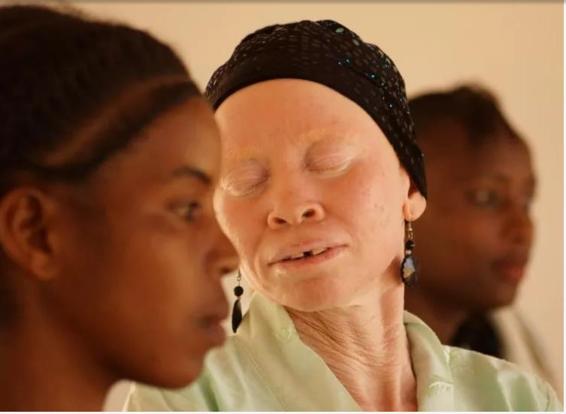
Benaiah Orajereyor Agejivwie
with albinism to possess potent charms for good luck and wealth.
These misguided beliefs have fueled attacks on people with albinism, leading to increased efforts by the government and NGOs to raise awareness and combat this dangerous misconception.
In Tanzania and other parts of Africa, albinos face persecution and even murder or mutilation for their body parts.
Photo by MARILENA DELLI
Nigeria:
In Nigeria, albinism is often associated with negativity, seen as a sign of bad luck or a curse. Some traditional communities believe that albinos bring misfortune and should be avoided. However, there are also positive perceptions of albinism in some communities, with certain Nigerian cultures considering albinos to possess unique spiritual powers or abilities.
14
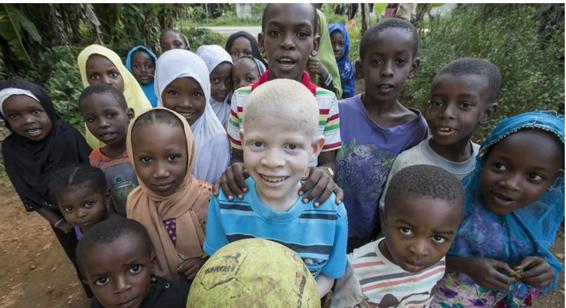
THE HISTORY OF ALBINISM IN AFRICA: MYTHS, LEGENDS, AND SUPERSTITIONS
The Nigerian government has implemented initiatives to challenge harmful beliefs and promote the inclusion and protection of people with albinism.
Photo By Quadri Adejumo
Kenya:
Kenya has witnessed numerous cases of violence against albinos similar to Tanzania, due to deep-rooted superstitions. Some traditional beliefs hold that albinos are ghosts or mystical beings who can evoke blessings or curses. This misconception has led to a demand for albino body parts in witchcraft practices.
Fortunately, organizations such as the Albinism Society of Kenya(more on this in another chapter) have been actively working to educate communities and promote acceptance and equality for individuals with albinism.
15
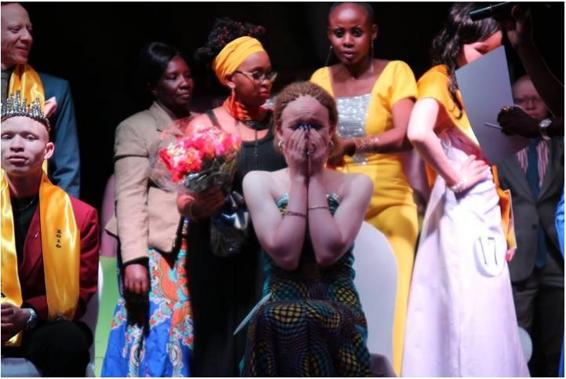
Benaiah Orajereyor Agejivwie
Kenya battles albino stigma with national beauty pageant Photo By: Issac Mwaura
South Africa:
In South Africa, traditional beliefs surrounding albinism are diverse, with varying attitudes depending on the region and cultural group. While some South African communities consider albinos to possess spiritual abilities, others view albinism as a punishment or curse. Efforts are underway to promote understanding and inclusion, including the Albinism Society of South Africa, which advocates for the rights and well-being of individuals with albinism.
16
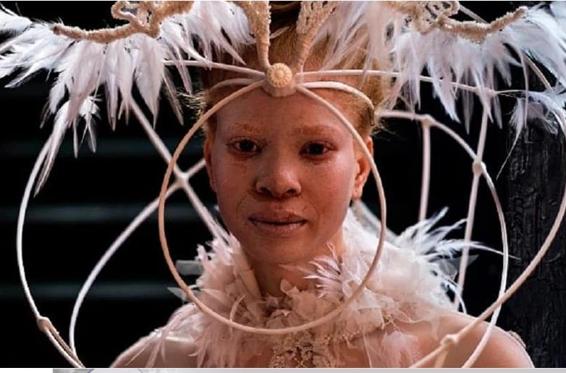
THE HISTORY OF ALBINISM IN AFRICA: MYTHS, LEGENDS, AND SUPERSTITIONS
An albino model wearing a creation waits to access a private lounge during the fashion show at the 2017 Durban July horse race in Durban, on July 1, 2017.
Photo By: TOPSHOT –
Malawi:
Malawi has experienced a significant number of attacks on people with albinism throughout history, driven by a belief in the supernatural powers associated with their body parts.
Traditional healers in Malawi, known as " anamalangidwe," are believed to possess the ability to use albino body parts for rituals that can bring good fortune or cure ailments.
Gladly, the Malawian government, along with NGOs, is actively engaged in initiatives to discourage these superstitions and protect people with albinism from harm.
17
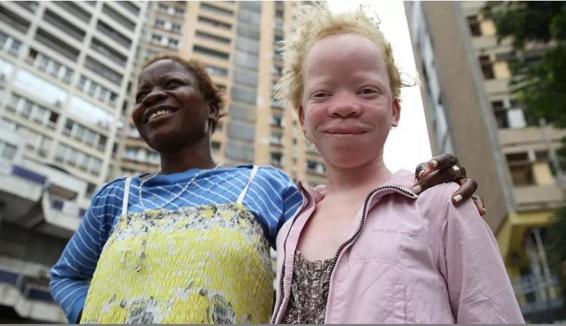
Benaiah Orajereyor Agejivwie
Malawi court bans traditional healers to avert albino killings Photo By: Ismail Akwei
Zimbabwe:
In Zimbabwe, albinism is often associated with superstitions and myths, as other African countries we’ve considered.. Some traditional beliefs consider albinos to be mystical beings, possessing a unique power or connections to the spirit world.
Others view albinism as a result of infidelity or a curse on parents who birth them.
The Zimbabwe Albino Association (ZAA) has been working tirelessly to create awareness and advocate for the rights and well-being of individuals with albinism.
18
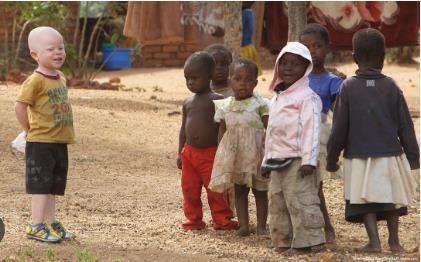
THE HISTORY OF ALBINISM IN AFRICA: MYTHS, LEGENDS, AND SUPERSTITIONS
Zambians with albinism fight for end to brutal attacks – DW – 01/29/2017
By Chrispin Mwakideu Image: picture-alliance/dpa/T.Mukwazhi
Ghana:
The Ghanian traditional belief often depict albinos as bearers of misfortune (bad luck), and some communities consider them to be cursed or bringers of bad luck. These negative perceptions have led to social stigmatization and discrimination against albinos.
In recent years, Ghanaian organizations and activists have made progress in challenging these misconceptions and try promoting inclusivity and equality.
19
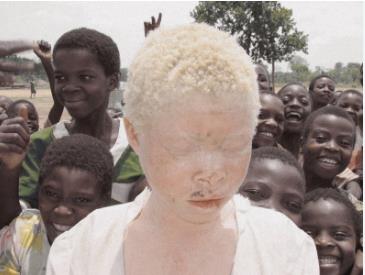
Benaiah Orajereyor Agejivwie
Acts of Discrimination against Albinos: Yusif Fatau’s educational dreams shattered Photo By: Adama Bukari
Ivory Coast:
A mixture of beliefs surrounds how albinism is viewed in Ivory Coast. As stated already, some traditional communities associate albinos with bad luck, others believe that they possess unique spiritual qualities.
It is not uncommon for albino individuals in Ivory Coast to be sought after by traditional healers who believe in the potency of their body parts for rituals or to be used as protective charms.
Efforts to educate and raise awareness are ongoing in Ivory Coast to combat these harmful practices and ensure the safety and well-being of people with albinism.
20
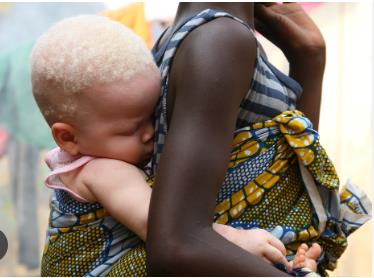
THE HISTORY OF ALBINISM IN AFRICA: MYTHS, LEGENDS, AND SUPERSTITIONS
For a better life in C̫te d'Ivoire РBiggerpictureclothing Photo By: Freek Van Litsenburg
Cameroon:
Traditional beliefs about albinism in Cameroon are similar to those found in other African countries. Albinos are often considered to possess supernatural qualities, such as the ability to ward off evil spirits or to bring good luck.
Nevertheless, there are also instances of discrimination and violence against individuals with albinism due to misunderstandings and harmful superstitions.
Local organizations and advocacy groups are actively engaged in promoting inclusivity and combating stigmatization.
21
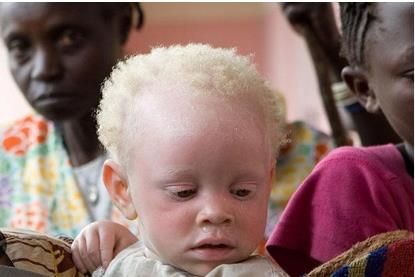
Benaiah Orajereyor Agejivwie
Cameroon Albinos Ask for Greater Attention, Care - allAfrica.com Photo By: Moki Edwin Kindzeka
Senegal:
Senegal is not left out in this myth for albinos. Albinism is generally accepted and respected within their society. Traditional beliefs recognize the uniqueness of individuals with albinism in Senegal, and they are often seen as having spiritual powers or connections to the divine.
While some prejudices and misconceptions still persist here, highlighting the need for continued education and awareness campaigns to foster a more inclusive society for people with albinism is ongoing by different NGOs.
22
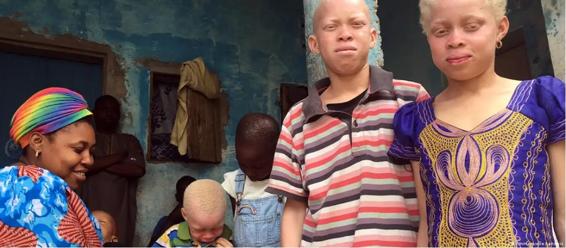
THE HISTORY OF ALBINISM IN AFRICA: MYTHS, LEGENDS, AND SUPERSTITIONS
Challenges facing albinos in Senegal – DW – 04/12/2016
Photo By: Emmanuelle Landais/fm
In the next section, we will delve into some oral traditions and folklores surrounding the beliefs of most Africans on albinism.
23
4 ALBINISM IN AFRICAN ORAL TRADITIONS AND













